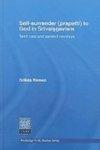
Book Summary
This book deals with the history of interpretation of a theological concept of self-surrender - prapatti - in late 12th - 13th century religious texts of the Shrivaishnava community of South India. It is a unique textual study, which shows that medieval sectarian formation in its theological dimension is a fluid and ambivalent enterprise, where conflict and differentiation are presaged on "sharing," whether of a common canon, or two languages (Tamil and Sanskrit), a common saint, a common corpus of rituals or of a "meta-social" arena such as the temple itself. Arguing that the core ideas of prapatti in these texts reveal the description of a heterogeneous theological concept, its nature dependent on the status of its practitioner, this book demonstrates that this concept is theologically moulded by the emergence of new literary genres, such as commentaries with hagiographical elements, in this period. The author puts forward the idea that this original heterogeneous understanding of prapatti is a majorcontributory cause to the emergence of sectarian divisions among the Shrivaishnavas, which lead to the eventual formation of two sub-sects, the Tenkalai and the Vatakalai, who stand respectively, for the "cat" and "monkey" theological positions. The book contributes to a new, intellectual history of medieval Indian religion with a specific emphasis on South Indian Shrivaishnavism. It will be of interest to scholars of Shrivaishnavism and Hindu and Indian Religious Studies.
Book Details
| Book Name | Self-Surrender (Prapatti) To God In Shrivaishnavism: Tamil Cats Or Sanskrit Monkeys? |
| Author | Srilata Mueller, Srilata Raman, S. Mueller |
| Publisher | Routledge (Feb 2007) |
| ISBN | 9780415391856 |
| Pages | 256 |
| Language | English |
| Price | 7768 |








